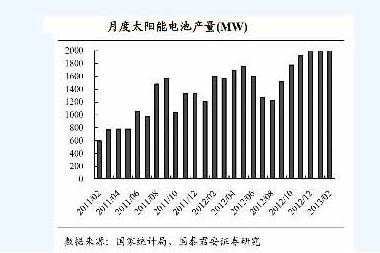The product range of Hongchuang hardware fasteners includes hexagon head screws, full thread and half thread hexagon socket head cap screws, hexagon wood screws, hexagon socket head cap screws, full thread and half thread hexagon socket countersunk head screws, hexagon socket head flange screws, set screws, etc. We provide products conforming to DIN, ANSI and JIS standards.
Stainless steel of grade 304 contains nickel of 8% and chromium of 18% and is the most commonly used grade for the production of fasteners. It possesses an excellent combination of strength, corrosion resistance and fabricability. Fasteners of this grade are being extensively used today in almost every industry.
Metal Screw,Self Tapping Screws,Stainless Steel Screws,Steel Screws Taizhou Hongchuang Hardware Co., Ltd. , https://www.taizhouhongchuang.com
EU “double-reverse†forced new living law for domestic PV companies
The EU "double anti-dumping" case has become a looming threat for domestic solar panel companies, creating widespread anxiety across the entire market. On June 6, the European Union is set to vote on the "double anti-" measures targeting Chinese photovoltaic products. However, according to recent reports, the EU has already started implementing a registration system for solar products imported from China since March this year. Some industry players view this as an early signal of potential tax adjustments or trade barriers. If this turns out to be true, many PV companies could face significant challenges in the second quarter, prompting some to bypass traditional dealers and directly enter the EU market.

This move appears to be a short-term strategy by domestic manufacturers to cope with the pressure. However, the EU's ongoing "double opposition" measures suggest that the battle is far from over. In response, several companies have begun preparing for a long-term struggle. Expanding into self-built power plants and exploring emerging markets have become key strategies for mitigating the impact of the EU's trade policies. Several listed companies, including SunPower, Hareon Solar, Aerospace Electromechanical, Sunflower, Zhonghuan, ST Super Day, and others, have taken steps to build their own power generation facilities.
While investing in downstream photovoltaic power plants can offer long-term value, it's important to note that such projects require substantial capital and have extended payback periods. Only well-established companies with strong financial backing are likely to succeed in this space. A few years ago, financing for solar companies was relatively easy. However, after the financial crises involving Jiangxi Saiwei and Wuxi Suntech, banks and other financial institutions have become more cautious about lending to the sector. As one company put it, "It's not just hard to get more financing—it's even harder to get any at all."
Despite these challenges, some small and medium-sized PV companies in Zhejiang have managed to navigate through the crisis successfully. Their resilience stands in stark contrast to the struggles of others, making them stand out in the industry. For example, Hangzhou Foster Hot Melt Adhesive Film Co., Ltd., a manufacturer of photovoltaic films, has found success by selling its products to niche markets such as toy manufacturers, small batteries, and holiday lighting. This diversification helped them achieve sales exceeding 100 million yuan last year.
Another example is Zhejiang University Sunni Energy Technology Co., Ltd., which initially faced difficulties due to overcapacity. Instead of competing on scale, they focused on developing specialized products like solar street lights, effectively avoiding the risks associated with the broader industry. Meanwhile, another Zhejiang-based PV company has started planning overseas manufacturing facilities and has enlisted Morgan Stanley as an investment advisor. They believe that establishing factories abroad is the most effective way to circumvent the EU’s "double anti-dumping" measures.
For the Chinese PV industry, the challenge isn’t just about stopping production—it’s about finding sustainable growth in a rapidly changing global market. The EU’s trade actions are pushing domestic companies to innovate, diversify, and look beyond traditional markets. Whether they will emerge stronger from this period of uncertainty remains to be seen.